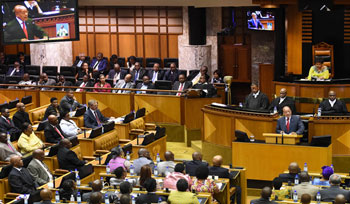
Subscribe & Follow
#AfricaMonth
In the news
One step forwards, one back for democracy
If they had done it in Rwanda, they would probably have been driven into exile, and pursued even there, with their lives at risk. Exiled critics of the Kigali government seem to have a habit of walking into bullets and garrottes.
In Ethiopia they would almost certainly have been arrested and sentenced to long terms of imprisonment alongside the 17 other writers currently in prison there for doing little more than protesting against censorship.
In SA there was pushback - and within days security agencies were backtracking and the speaker was giving an undertaking in court it would not happen again, as was the president in a meeting with the country's top editors.
A hideous overreaction
SA has a way of undermining and strengthening its democracy at the same time. One step backwards, and one step forwards. What we saw on the evening of President Jacob Zuma's state of the nation speech was the security agencies seizing control of Parliament in a way that was alarming and shocking, a hideous overreaction to the threat of a bit of rowdy disruption. Only hours later, under pressure, the politicians had to admit to at least some of their misjudgements, which had put the focus of an angry media on them rather than their disruptive opposition.

It was a night in which few emerged with credit - apart, maybe, from Chief Justice Mogoeng Mogoeng, who quietly left when the security men entered the House, as if he could not or did not want to watch this travesty.
Media organisations were in court during the week to ensure these things do not happen again, and to try to wrest control of parliamentary TV coverage from the hands of an overprotective speaker, prone to turn the cameras off when interesting (but embarrassing) things happen.
It is not clear yet whether the politicians can keep the initiative and send the security agencies back to their caves. While there was pushback, what we don't know - and might never know - is exactly who made the crucial decisions and who will take responsibility for the blunders. At the moment, the president and speaker are shrugging their shoulders, and State Security Minister David Mahlobo is calling it a "glitch", saying the intention of the jamming device was to protect against drones - an explanation so implausible that they are taking us for fools.
Zero accountability
That is where our system falls down: those with authority or power seldom take responsibility for what happens on their watch. We still accept the "I didn't know" excuse, even when this shows neglect of the duty to know. It is the same reason we still don't know exactly who made the crucial decisions in the Gupta-Waterkloof airport scandal or the Nkandla rip-off. No one resigns and juniors are expected to take the rap. This is not new - it is one of those habits inherited from apartheid, and is the reason Eugene de Kock was just about the only apartheid killer who went to prison, while his political bosses are still having streets named after them.
But this week senior editors met the president and they talked of "the South African way" where "dialogue and negotiation was the preferred route to resolve problems". The president appears to have raised hoary concerns about newspapers not properly correcting their mistakes, or showing dead bodies, with little awareness of moves in recent years to change these practices. But it was a discussion that went some way to clear the air, and led to promises of more meetings. Talks are also taking place with the speaker of Parliament, the State Security Ministry and provincial legislatures where there have been problems.
That would not have happened in Zimbabwe, Rwanda or Ethiopia.

About Anton Harber
Anton Harber, Wits University Caxton Professor of Journalism and chair of the Freedom of Expression Institute, was a Weekly Mail (now Mail & Guardian) founding editor and a Kagiso Media executive director. He wrote Diepsloot (Jonathan Ball, 2011), Recht Malan Prize winner, and co-edited the first two editions of The A-Z of South African Politics (Penguin, 1994/5), What is Left Unsaid: Reporting the South African HIV Epidemic (Jacana, 2010) and Troublemakers: The best of SA's investigative journalism (Jacana, 2010).Related
Anton Harber | Protection orders being used to silence journalists and activists 1 Apr 2025 Newly launched Free Expression Legal Network to increase protection for media freedom 21 Feb 2025 SABC clarifies news independence amid viral FlySafair video uproar 29 Dec 2024 The high cost of a cyberattack: Tips to secure your business this festive season 21 Nov 2024 DPWI in hot water again over Mbombela High Court crisis 4 Nov 2024 Companies can do much more to empower women 29 Aug 2024
















